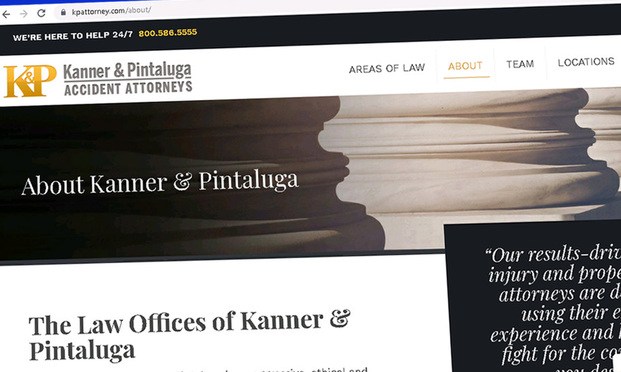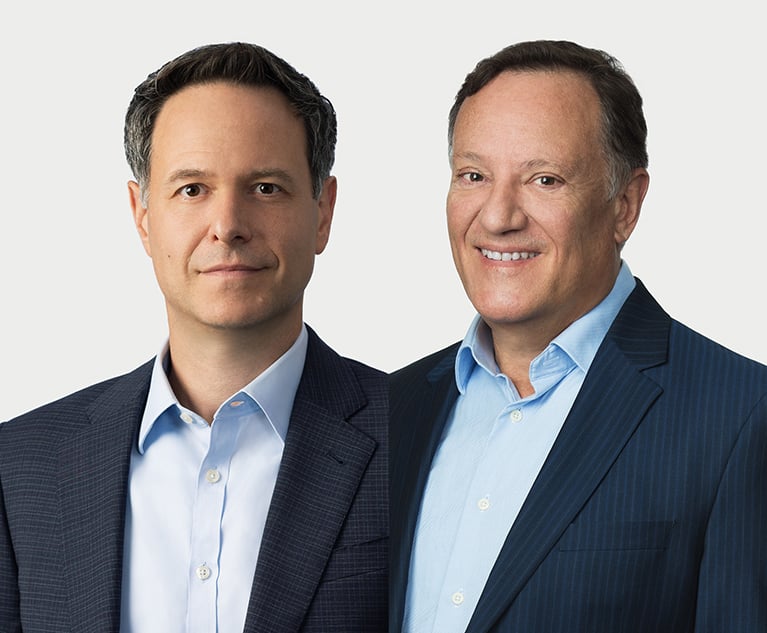Boca Raton Firm Accuses Boutique of Misleading Google Ad Tactics
The firm accused of using Google AdWords to misdirect Kanner & Pintaluga's potential clients says the claims are baseless and vows to fight them.
December 03, 2019 at 02:20 PM
6 minute read
The original version of this story was published on Daily Report
 Kanner & Pintaluga's website. (Photo: Screenshot)
Kanner & Pintaluga's website. (Photo: Screenshot)
Boca Raton-based personal injury law firm Kanner & Pintaluga is crying foul over what it claims are unfair advertising practices by an Atlanta firm, which is allegedly steering away potential clients with a Google AdWords campaign.
The K&P complaint filed in Fulton County Superior Court claims Atlanta's Kaufman Law is violating K&P's trademark and "misleading" the public by purchasing K&P's name through Google.
The service allows businesses to bid for specific search words and terms, then place clickable links above the resulting search pages "in a manner that makes Kaufman's advertisements appear as related to or derived from K&P."
A screenshot attached to the complaint shows a search page for K&P with a link at the top to Kaufman's website with the word "Ad" followed by the message, "Atlanta Accident Attorney—Kaufman Law—Personal Injury—Car accident? Schedule your free consultation today—no upfront costs!"
Directly beneath is a link to the K&P webpage and the message "Law firm in Atlanta, Georgia" and the familiar Google links to office hours, the firm's webpage and reviews.
The complaint asserts "Kaufman's AdWords scheme causes confusion and mistake among consumers as to the source or origin of Kaufman's advertisements, particularly among consumers utilizing mobile devices who are unable to distinguish between organic search results and paid advertisements, and misleads such consumers into believing they are being directed to the K&P website, when in fact, they are being directed to Kaufman's website."
Google is not a defendant in the complaint.
When the Daily Report entered K&P's name on a Google search, four entries marked "Ad" appeared with links to websites offering legal services, but they did not contain any particular attorney or firm names. Below them was a link to K&P's site.
Also attached to the lawsuit is a copy of an Aug. 15 cease-and-desist letter demanding Kaufman stop using K&P's name or any similar variation, stop buying its name and marks through AdWords or any other keyword marketing service, and use "negative keywords" so that its name does not pop up in any online search for K&P.
As recently as Nov. 5, the complaint said Kaufman's ads continued to appear at the top of the page when K&P was entered as the search term.
According to its website, K&P employs more than 40 lawyers in offices in eight states specializing in personal injury cases. The firm has 11 offices in Florida from Miami to Panama City.
The complaint was filed by Shane O'Neill with Weinberg, Wheeler, Hudgins, Gunn & Dial in Atlanta and Aaron Davis and Daniel B. Allison with Davis Goldman in Miami.
O'Neill said he is not at liberty to discuss the case.
Kaufman is a six-lawyer boutique that also specializes in personal injury cases. Founding partner Jeffrey Kaufman said he "has not purchased Kanner & Pintaluga's name for any purpose and certainly not as an ad word. Their false claim is reckless and damaging to Kaufman Law."
Kaufman said he nonetheless complied with the cease-and-desist letter's demands, "but they sued us anyway."
The firm has retained Freeman, Mathis & Gary partner Robert Buckley to fight the suit.
"Freeman Mathis & Gary was only recently retained, and we're still gathering information," Buckley said. "Our client intends to vigorously defend itself against these untrue allegations."
The complaint asserts claims for "unfair, unlawful, and/or deceptive practice that infringes upon K&P's common law service marks," trade name infringement and violation of Georgia's Deceptive Trade Practices Act.
It includes a request for an injunction "preventing Kaufman from using the K&P name as part of its AdWords scheme, alone or in combination with any other letters, words, letter strings, phrases, or designs in commerce" related to its business.
The complaint's assertions are similar to those leveled against a Texas legal advertising company in 2017 by several firms accusing it of hijacking their names in online searches and rerouting queries to its customers.
That litigation resulted in at least three courts across the county issuing injunctions barring Exclusive Legal Marketing from using Google's ad services to misappropriate law firm names.
Another case filed by Orlando-based personal injury powerhouse Morgan & Morgan ended with a confidential settlement last year.
Damien Prosser, an Morgan partner in Orlando who led that litigation, reviewed the K&P complaint and said its allegations are very similar to other cases his firm initiated after a competitor used GoogleAds in an effort to siphon away business online.
Often, an employee or outside ad agency is running a firm's advertising, he noted.
"The first thing they'll say is, 'We didn't know, it's our ad people,' " Prosser said. "Usually, a cease-and-desist letter is enough to get the firms to stop and to do a negative keyword so their ad will not show up when someone enters your name."
That ends most cases, but a few have proceeded to litigation.
"We've had one or two very large settlements," he said.
Particularly in a field like legal services, Prosser said there is a danger that an unsophisticated client who needs a qualified attorney to handle a complex or high-exposure case may be diverted to one more likely to push for a quick settlement.
Mark VanderBroek, a partner at Nelson Mullins Riley & Scarborough in Atlanta, represented personal injury firm Montlick & Associates in one of the suits against ELM.
After looking at the K&P complaint, VanderBroek said it was similar to the claims in the Montlick case, although that case included claims of additional wrongdoing.
"The entities we were dealing with on behalf of Montlick were doing other questionable things," he said, including not identifying the encroaching firms in the search results or when an unwary caller phoned a number by mistake.
"From the complaint, it looks like the Kaufman firm does have its name identified as part of the search engine content," he said.
This content has been archived. It is available through our partners, LexisNexis® and Bloomberg Law.
To view this content, please continue to their sites.
Not a Lexis Subscriber?
Subscribe Now
Not a Bloomberg Law Subscriber?
Subscribe Now
NOT FOR REPRINT
© 2025 ALM Global, LLC, All Rights Reserved. Request academic re-use from www.copyright.com. All other uses, submit a request to [email protected]. For more information visit Asset & Logo Licensing.
You Might Like
View All
Judge Slaps $16 Million Penalty on Defendants in Wyndham Timeshare Advertising Fraud Case
4 minute read
Gibson Dunn Recruits S&C Partner to Co-Lead M&A Practice, in 2-Partner Hire

Consumer Class Action Accuses Fabletics of Misleading Customers of 'VIP Membership Program' Value
Law Firms Mentioned
Trending Stories
- 1DC Bar’s Proposed Anti-Discrimination, Harassment Conduct Rule Sees More Pushback
- 2California's Chief Justice Starts Third Year With Questions About Fires, Trump and AI
- 3Justin Baldoni Sues Blake Lively and Ryan Reynolds for $400M in New Step in 'It Ends With Us' Fight
- 4Top Leadership Changes Coming for NJ Attorney General's Office
- 5SCOTUSBlog Co-Founder Tom Goldstein Misused Law Firm Funds, According to Federal Indictment
Who Got The Work
J. Brugh Lower of Gibbons has entered an appearance for industrial equipment supplier Devco Corporation in a pending trademark infringement lawsuit. The suit, accusing the defendant of selling knock-off Graco products, was filed Dec. 18 in New Jersey District Court by Rivkin Radler on behalf of Graco Inc. and Graco Minnesota. The case, assigned to U.S. District Judge Zahid N. Quraishi, is 3:24-cv-11294, Graco Inc. et al v. Devco Corporation.
Who Got The Work
Rebecca Maller-Stein and Kent A. Yalowitz of Arnold & Porter Kaye Scholer have entered their appearances for Hanaco Venture Capital and its executives, Lior Prosor and David Frankel, in a pending securities lawsuit. The action, filed on Dec. 24 in New York Southern District Court by Zell, Aron & Co. on behalf of Goldeneye Advisors, accuses the defendants of negligently and fraudulently managing the plaintiff's $1 million investment. The case, assigned to U.S. District Judge Vernon S. Broderick, is 1:24-cv-09918, Goldeneye Advisors, LLC v. Hanaco Venture Capital, Ltd. et al.
Who Got The Work
Attorneys from A&O Shearman has stepped in as defense counsel for Toronto-Dominion Bank and other defendants in a pending securities class action. The suit, filed Dec. 11 in New York Southern District Court by Bleichmar Fonti & Auld, accuses the defendants of concealing the bank's 'pervasive' deficiencies in regards to its compliance with the Bank Secrecy Act and the quality of its anti-money laundering controls. The case, assigned to U.S. District Judge Arun Subramanian, is 1:24-cv-09445, Gonzalez v. The Toronto-Dominion Bank et al.
Who Got The Work
Crown Castle International, a Pennsylvania company providing shared communications infrastructure, has turned to Luke D. Wolf of Gordon Rees Scully Mansukhani to fend off a pending breach-of-contract lawsuit. The court action, filed Nov. 25 in Michigan Eastern District Court by Hooper Hathaway PC on behalf of The Town Residences LLC, accuses Crown Castle of failing to transfer approximately $30,000 in utility payments from T-Mobile in breach of a roof-top lease and assignment agreement. The case, assigned to U.S. District Judge Susan K. Declercq, is 2:24-cv-13131, The Town Residences LLC v. T-Mobile US, Inc. et al.
Who Got The Work
Wilfred P. Coronato and Daniel M. Schwartz of McCarter & English have stepped in as defense counsel to Electrolux Home Products Inc. in a pending product liability lawsuit. The court action, filed Nov. 26 in New York Eastern District Court by Poulos Lopiccolo PC and Nagel Rice LLP on behalf of David Stern, alleges that the defendant's refrigerators’ drawers and shelving repeatedly break and fall apart within months after purchase. The case, assigned to U.S. District Judge Joan M. Azrack, is 2:24-cv-08204, Stern v. Electrolux Home Products, Inc.
Featured Firms
Law Offices of Gary Martin Hays & Associates, P.C.
(470) 294-1674
Law Offices of Mark E. Salomone
(857) 444-6468
Smith & Hassler
(713) 739-1250







